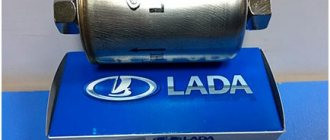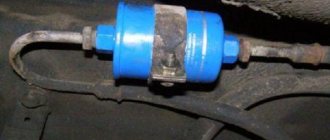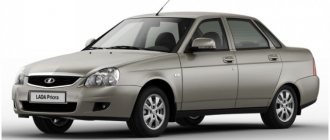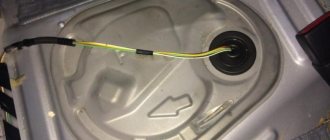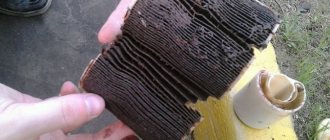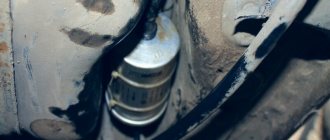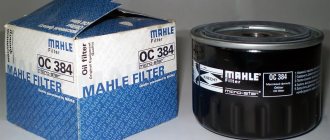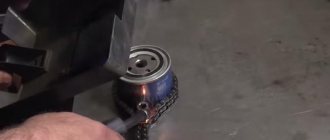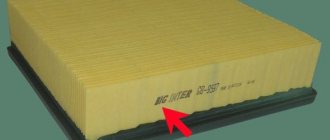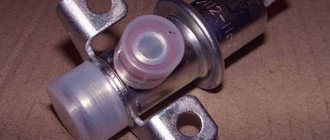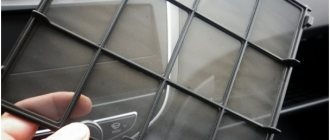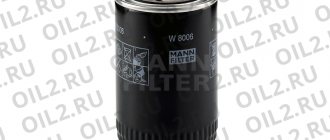Despite the constant improvement of quality standards, diesel fuel or gasoline almost always contains mechanical impurities and contaminants (corrosive particles, dirt), the presence of which negatively affects the operation of the car engine. To eliminate them, as well as to protect the system from water (condensate) entering the combustion chamber, fuel filters are used. The absence of the latter provokes premature wear of the fuel pump, as well as the injectors of the injection system.
Purpose, principle of operation
A fuel filter (or fine filter) is designed to remove dust, solid particles, sediment from the bottom of the gas tank, water, paraffins and, in general, everything unnecessary that hangs around in the fuel mixture and can damage the engine from the gasoline (diesel fuel, gas) entering the engine. The better the filter, the better the fuel will be cleaned, which means the engine will run longer without problems.
Schematic diagram of a direct-flow injection filter
The location of the filter is between the gas tank and the engine in front of the pump (or in front of the carburetor in older cars). Gasoline (diesel fuel) passes through the filter material under pressure, purifying it of impurities before further use. Filters for diesel engines also have a membrane for separating water, as well as a heating system that ensures the fluidity of diesel fuel at sub-zero temperatures.
It is impossible to clean the smallest pores of the filter from contaminants either at home or in an industrial environment, therefore, when the resource is exhausted (or earlier, if it is critically contaminated), the filter is simply replaced with a new one, and the old one is handed over for recycling.
What is the danger of dirt?
In carburetor-type engines, the ejector principle comes into force, when air at high speed pulls fuel with it at low speed. That is why, when developing jets, strict adherence to patterns and clearances is important. A discrepancy of a hundredth of a millimeter can have negative consequences on the operation of the system as a whole. In particular, the volume of air entering the system changes, power drops, throttle response decreases, and so on.
We must not forget about another potential problem - clogging of the injector (nozzle). It is no secret that in engines running on diesel fuel and gasoline, the fuel mixture and air are mixed directly in the engine. First, pressure is created, thanks to which the fuel mixture flows to the power unit.
For example, in gasoline engines the supply pressure is 10-20, and in diesel engines 100-200 atmospheres. In this case, the volume of fuel supply is regulated by the controller. As soon as the control body sends the appropriate signal, the injector valve opens, followed by spraying of the combustible mixture into the combustion chamber.
Diesel engines (usually older versions) used a slightly different principle for supplying the fuel mixture. In particular, the main operating “person” was a plunger pump that creates the necessary pressure. As for the volume of incoming fuel, the plunger mechanism takes on this work.
But that's not all. Contaminated fuel can cause problems for the cylinder head by clogging the spaces between the seat and the valve. As a result, a cavity forms and compression decreases. At the same time, almost all characteristics of the power unit deteriorate - power, resource, “gluttony” and so on.
Is a filter really necessary? What does it affect?
First of all, the purity of gasoline is important for the injectors of an injection engine: their thinnest holes become clogged with deposits of paraffins, sulfur, dust, dirt and other “goodies.” This is followed by deterioration in engine performance (after all, the required amount of fuel does not enter the cylinder and is not dissipated properly), loss of power, “triple”, when an injector in one of the cylinders fails, and after that - expensive repairs. For systems with a fuel injection pump (high pressure fuel pump), cleaning is carried out before fuel enters the pump: the fine fitting of the parts does not withstand foreign impurities. Buying a new pump also costs a considerable amount.
Clogged injectors
If we compare the quality of European and Ukrainian fuel, the latter will be far from winning: the purity of our gasoline is such that the service life of good imported filters is exhausted almost 2 times faster than the manufacturer expected. Impurities in gasoline appear both at the manufacturing stage (manganese to increase the octane number, sulfur and paraffins due to insufficient purification) and at the transportation stage (dust, dirt). The level of the plant itself will also be an important factor: gasoline purification is a delicate matter and requires modern, expensive equipment. You can evaluate the quality of the fuel yourself by disassembling the old filter after replacing it, as many car owners like to do. All the dirt that has collected in the filter could end up on the pistons, injectors and engine walls.
But, be that as it may, fuel filters are installed on absolutely all cars all over the world: no matter how clean the gasoline is, additional protection will not hurt. We have a good filter - not a precaution, but a vital necessity.
Every second vehicle produced in Germany runs on diesel
Turbochargers that can change the shape of internal turbines, which is standard for designers, and improvements in high torque, have made the Diesel legacy relevant in the modern automotive market. Skeptics are mistaken when they believe that such motors are a source of dirt, loud noise, inefficiency and general environmental pollution - a thing of the past. Special mechanisms process exhaust gases at a level that meets Euro-6 standards. And if, as of 1997, only 22% of vehicles were diesel, now over 60% of them are sold. And in 2022 there are great prospects for the development of this motor, combining it with electronics. This innovation was brought to life in the Peugeot 3008_Hybrid4 models and many others. Rudolf Diesel had no idea what the future of his invention would be, but an entry from his personal diary confirms that he had high faith in the potential of the invention. What is it about his creation that drivers from all over the world appreciate?
Types of fuel filters
The first step in the filter system is coarse cleaning: a regular dense mesh installed inside the gas tank, designed to filter out particularly large particles.
Next is the fine filter, which, in fact, is what we are talking about: it retains fine particles, which, nevertheless, can clog the injectors of an injection or diesel engine.
Different filters are made for different types of fuel: there are varieties for gasoline, diesel fuel, and gas.
The following fuel filters are distinguished by location:
- Submersible filters located in the fuel tank. This is a one-piece structure into which a fuel pump, a coarse filter and a fuel level sensor are connected.
Submersible filters
- Main filters that are included in the fuel line in the area from the gas tank to the pump. If a main filter is provided in the design of the car, then preliminary fuel purification is carried out directly in the gas tank (a fine-mesh mesh that retains large particles before they enter the fine filter)
Depending on the type of engine, there are:
- Filters for carburetor systems that are not demanding on the quality of gasoline. Such filters have the simplest design, allowing them to retain 60 percent or more of particles up to 15 microns in size.
- Filters for injection engines sensitive to gasoline purity. They have a more complex design, a durable body and can trap contaminants up to 10 microns in size.
- Filters for diesel engines requiring high-quality fuel, capable of retaining not only the smallest particles, but also water and paraffins. The best modern filters are capable of removing up to 95% of contaminants up to 5 microns in size!
- Filters for cars with LPG, since liquefied gas is also not particularly clean.
Purchasing a new item
When choosing this item, be sure to pay attention to the following parameters:
- filtration level. If it is not enough, and large particles get into the system along with the fuel, this will very quickly lead to engine failure;
- the area of the filter element, as well as the presence of a rubber seal that covers the entrance to the filter itself. If there is none, replacing this part will be very troublesome.
Depending on the fuel system, fine filters are divided into:
- carburetor, permissible degree of cleaning is 15-20 microns (the smallest particles will pass into this system, but will not harm the fuel supply system to the engine);
- injector, finer degree of purification, 5-10 microns (in such systems, the requirements for the maximum permissible size of contamination are higher, i.e. the injector can become clogged with larger particles, so the holes in the filter are smaller);
- diesel engines are capable of not only retaining very small solid particles (less than 5 microns), but also removing moisture, which is very important for a diesel engine.
When purchasing, it is important to tell the seller the make and year of your car in order to choose the right filter. For the most part, if there is no specific product for your case, then you can choose something interchangeable. But there are times when this is not possible, so check your vehicle's owner's manual for this information.
Subtlety of elimination
Screening fineness is an indicator of the number (as a percentage) of particles of a certain size that the filter retains.
The level distinguishes between average, nominal and absolute screening fineness with specification of particle size.
- Medium means that the filter captures 50% of particles of a certain size;
- Nominal – screening out 95% of particles;
- Absolute – complete screening, the filter retains 100% of particles.
In the characteristics of the filter, this indicator is indicated as follows: “Nominal screening fineness 15 microns,” and this means that the filter retains up to 95% of particles up to 15 microns in size.
Modern filters are developed in accordance with strict environmental standards, and their nominal screening fineness can be 6 microns, 4 microns or less. Such filtration is important primarily for diesel engines, which are more sensitive to fuel purity, and at the same time more hazardous to the environment than gasoline engines. The better the fuel purification, the less harmful emissions.
Filter design
The simplest filters are made for old carburetor engines: a filter element is installed inside the housing (often transparent to visually control the degree of filling) - special paper folded into a star-shaped curtain. Through the inlet pipe, gasoline enters the filter housing, passes through the paper and enters the outlet pipe. Such a system is quite sufficient for cars that are not demanding on the quality of gasoline.
Injection engines are much more sensitive to the quality of cleaning, and the fuel pressure in the system is an order of magnitude higher. They consist of a durable body (metal or high-quality plastic) and good filter material (paper is folded in a star shape or wound in a spiral, the second option is better in terms of filtration quality).
Diagram of a direct-flow injection filter
Diesel engines are the most demanding on fuel quality, which means that filters for them have the most complex design: not only separating solid particles, but also removing water, paraffins, sulfur and other impurities.
Diagram of a diesel filter with water separation
To achieve high filtration rates, a special material is used, the cells of which are not evenly spaced, but with a decrease in size from the surface to depth: larger particles are retained in the upper layers, smaller ones in the deeper ones. This internal structure greatly extends the life of the filter, because it clogs less and can pass fuel in the required volume for longer.
Features of execution
According to the method of execution, they are distinguished between direct-flow, screw-on and cartridge filters.
Direct-flow filters are used in carburetor and injection gasoline systems. There are pipes installed at the inlet and outlet through which the filter is connected to the fuel system. Gasoline enters the housing, passes from the outer walls to the center through the filter element and is sent for further use. The pipes can be located either on one side of the filter (in the cover) or on opposite sides.
Screw-on filters have a threaded connection with which they are connected to the fuel line. Fuel enters through a larger diameter with holes around the circumference, and exits through a smaller central one. Such filters are designed for high pressure and are made in a durable metal case or plastic case with a metal lid.
The filter cartridge consists of a metal casing (glass) and a replaceable core with a filter part. The filter element can be purchased separately, and thus save money on regular fuel filter replacements.
Filters for injection engines have a fuel pressure regulation system: an additional outlet pipe into the gas tank, through which excess gasoline is removed from the system. In diesel engines, filters also remove air bubbles and are designed with a bleeder valve to release excess air.
In diesel filters, the container (often transparent) for collecting water has a drain valve through which accumulated water can be drained from the filter.
Thus, the modern fuel filter has evolved from a simple device to a self-regulating system necessary for long and high-quality engine operation.
Operating the fuel filter
Actually, operation does not require special attention from the car owner: all requirements boil down to purchasing a high-quality filter, correct installation and timely replacement. For diesel cars, filters with a water sump can be installed; then, from time to time, accumulated condensate must be drained from them through a special valve.
Since the filter model depends on the engine model (cars of the same brand can have different engines, which means they need different filters) and its volume (the larger the engine volume, the larger the filter volume), the replacement schedule is indicated in the service book. When undergoing maintenance, the fuel filter is changed as one of the consumables.
On average, a filter for gasoline injection engines has a service life of up to 40 thousand km. For diesel filters, the resource depends on the method of laying the filter element: a radially folded “star” will last approximately 24 thousand km, and a spiral winding has a much longer resource - up to 40 thousand km.
The filter life is affected by several factors:
- The quality of gasoline, the purer the gasoline, the longer the filter will work fully.
- The quality of the filter itself. The filter element (special paper) is produced by just a few large specialized factories, which receive orders from filter manufacturers. The totality of the design of all parts (body, cover, filter core, pipes, etc.) also determines the service life of the filter itself, because in addition to clogging, it can leak, crack and present other unpleasant surprises.
- Changing summer diesel fuel to winter and vice versa. Paraffins that accumulate in the filter clog it tightly, rendering it unusable, so switching to winter fuel is one of the conditions for the uninterrupted operation of the fuel system.
Paraffins in the fuel filter
- Emergency situations that arise during vehicle operation. For example, water condensate may freeze in the filter and thus damage the porous filler.
- Poor quality gasoline. Impurities that are sometimes added to fuel corrode the filter element, rendering it completely unusable in a very short time. That is why most drivers prefer to refuel at gas stations of large companies that monitor the quality of fuel.
On diesel cars, an additional heater for the filter can be installed: in winter, the fuel thickens during parking until a dense gel is formed, and to facilitate engine starting, pre-heaters are installed on the filter, heating diesel fuel to a temperature above the freezing point of paraffins.
Diesel filter with heater
How to spot a fake
Many consumables used in cars are counterfeit. Fuel filters are no exception. Moreover, counterfeits are found not only of expensive brands, but also of products from the middle and even lower price categories. As a rule, counterfeit goods are produced in China or even the Russian Federation. To minimize the risk of buying counterfeit filters, you need to follow a few simple rules:
- Appearance of the filter. All original manufacturers care about the quality of manufacturing of the housing and filter element of the mentioned products. Accordingly, before purchasing, you must carefully inspect the filter housing. It must be made carefully. It is desirable that the housing contains information about the technical parameters of the filter, engraving/stamping, and the manufacturer’s logo.
- Appearance of the packaging. Good manufacturers of automotive consumables never skimp on the quality of packaging for their products. So, the printing on the original box will always be of high quality. This applies to printing, drawings, fonts (they should not be “floating”). It is not allowed to contain grammatical errors and/or the presence of foreign characters in the description, for example, hieroglyphs. The logo on the packaging must always correspond to the manufacturer or packaging company.
- Availability of gaskets. Thus, original fuel filters are usually always equipped with additional gaskets (where necessary) to ensure the tightness of the fuel system. They are made of special fuel-resistant rubber. Although this fact depends on the specific manufacturer and when purchasing, you need to read the package contents.
- Price. You cannot buy frankly cheap fuel filters, since they will either be of very low quality or are simply an outright fake. It makes sense to purchase products from the middle or higher price range. This is especially true for injection engines of business class cars and cars equipped with diesel engines. Having saved once on a filter, the car owner in the future may face expensive repairs of engine components, in particular, its fuel system.
- Outlets. It is better to use the services of trusted stores that have all the permits for the right to trade. In addition, it is desirable that the retail outlet be an official representative of a particular manufacturer of fuel filters. Avoid dubious retail outlets with small quantities of goods.
All leading filter manufacturers protect their original products using modern technology. There are many similar options, ranging from sending SMS messages with a code on the package to checking the originality using a QR code by visiting the manufacturer’s official website. Such approaches practically eliminate the possibility of purchasing counterfeit products.
Signs of a clogged or failing fuel filter
A filter malfunction is manifested, at best, by a decrease in fuel supply:
- Gasoline consumption increases;
- “Trippling” - one of the engine cylinders does not work;
- The engine power decreases, which becomes noticeable during acceleration or driving uphill. This is a rather dangerous situation on the highway when, instead of overtaking the car in front, you end up with “synchronized skating” due to the inability to pick up speed;
- The car suddenly stalls while driving or at a traffic light;
- The engine does not start at all.
If the cause is a clogged fuel filter, these faults can be easily eliminated by simple maintenance. There are also worse options: if the filter turns out to be of poor quality or the internal structure is damaged, unrefined gasoline will flow into the fuel injection pump and engine, leading to more serious problems. This will be heard from the operation of the pump (noise during movement) and the engine (the same “triple movement”, vibration and loss of power).
What is the replacement period?
In the average version, manufacturers recommend replacing filters after 30,000 km. Many car owners, through experimental observations, also came to this mileage figure.
Symptoms that the filter needs to be changed may include:
- Triple
- And turning off the engine
Of course, not everything can be exactly like that. When you refuel at gas stations known for their high quality fuel, adhere to a leisurely driving style, and rarely drive on rural roads, then you can greatly increase the frequency of filter changes. But in practice this rarely happens.
Selecting a fuel filter
The filter installed on the car is only the one that strictly corresponds to the engine parameters, neither better nor worse. Injection filters are not suitable for carburetor systems, and if you really want to get high-quality filtration, you need to choose a filter of higher quality, but of the appropriate type.
When choosing, you need to focus on the engine brand and technical parameters: external and internal diameters, diameters of the inlet and outlet pipes, overall dimensions of the housing. When purchasing, you should also pay attention to the complete set of the filter: many manufacturers add spare o-rings, which will come in handy when replacing the filter.
On average, the larger the engine size, the larger the filter volume and its throughput will be.
Inspection of the used filter
The condition of the removed filter can tell the car owner a lot:
- There is a lot of black dust in the filter pleat - the presence of manganese additives in gasoline;
- The filter is all clogged with dirt - the fuel contains a large percentage of resins and asphaltenes;
- Black mucus on the filter element – there is fungus or bacteria in the fuel;
- Wave-like curvature of the corrugated element - there is a large amount of water in the fuel.
But the condition of the outside is not as important as the type of filter inside the central channel: if there are no deposits on the inside and the paper is clean from the inside, then the filter coped with its task.
